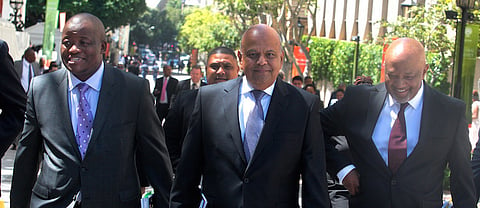Treasury DG contract expiry raises concern of another Zuma “Weekend Special”
After Deputy Finance Minister Mcebisi Jonas went public, it's now well accepted that Nenegate was sparked by an attempted takeover of South Africa's National Treasury. So, too, is that one of the four dedicated professionals set to be relieved of duty by President Jacob Zuma's "Weekend Special" Finance Minister is respected Director General Lungisa Fuzile. The Treasury takeover plan was a repeat of what happened at the SA Revenue Services where a painstakingly assembled top team was rapidly replaced once the Zupta appointee was parachuted into the top job. Although the Zupta nemesis Pravin Gordhan was reappointed Minister of Finance after Nenegate, the war for control of National Treasury isn't over. That brings into stark focus the fact that Fuzile's five year employment contract expires next month. In the normal times, it would be simply be rolled over. But these are anything but normal times in SA – and investors are starting to fret about another looming battle in the State Capture engagement. The Zuptas have been weakened by recent disclosures and Zuma's lashing by the Constitution Court, but even those setbacks might not stop another tilt at acquiring this most critical of State institutions. – Alec Hogg
By
(Bloomberg) — South Africa's government will announce in the next few weeks if it will replace Lungisa Fuzile as head of the National Treasury when his five-year contract ends in May, a move that could prolong months of investor unease over the management of the nation's finances.
President Jacob Zuma roiled markets in December by replacing the respected Nhlanhla Nene as finance minister with a little-known lawmaker. While the president reappointed Pravin Gordhan four days later to the position that he held from 2009 until 2014 after pressure from political and business leaders, police are probing the minister's involvement in establishing an allegedly covert investigative unit within the national tax agency.
"There would definitely be concern if Fuzile was not reappointed, given all the things that have happened these past few months," Christie Viljoen, an economist at KPMG LLP, said by phone from Cape Town on Wednesday. "There would be concern that he could be replaced by someone with different experience, different knowledge and a different agenda."
Fuzile denied rumors in December that he was told not to reapply for his position. This week he said his contract will be discussed when the time is right and that it's now reached the stage when he has to think about it.
Credit Rating
In the two days after Nene was replaced, the Johannesburg Stock Exchange lost 170 billion rand ($11.2 billion) and bonds and the rand plummeted, making the currency the third-worst performer in 2015 among 24 emerging markets tracked by Bloomberg.
The nation risks losing its investment-grade credit rating with Standard & Poor's due to review its BBB- assessment, which is one level above junk, in June. Moody's Investors Service put its assessment, which is one step higher, on review for a downgrade last month.
"Any further changes at the Treasury would only be viewed negatively and would likely trigger a negative market reaction," Razia Khan, head of Africa economic research at Standard Chartered Plc in London, said in an e-mailed response to questions. "Any non-renewal of the director-general's term would erode confidence in South Africa's future, with potentially difficult-to-reverse consequences."
Fuzile is leading a process to determine how much Zuma must repay for non-security upgrades at his private home after the Constitutional Court ruled last week that the president violated the constitution by failing to comply with an order of the graft ombudsman to pay back taxpayer funds. The determination has to be made by the end of May.
Fuzile, a former teacher, took control of the Treasury from Lesetja Kganyago in May 2011 as Africa's most-industrialized economy struggled to recover from the global financial crisis. He has overseen the implementation of a spending ceiling and had to steer the nation's finances during a period in which the rand lost more than 50 percent of its value against the dollar and South Africa's credit-rating was downgraded to the brink of junk status.
"Change makes people uncertain," Dave Mohr, who helps oversee 110 billion rand as chief investment strategist at Cape Town-based Old Mutual Multi-Managers, said by phone. "There are many capable people within the Treasury. If an outsider came in, I think that would be upsetting."

